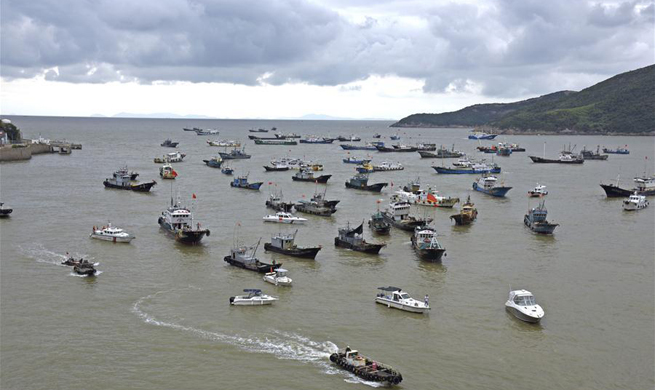BRUSSELS, Sept. 12 (Xinhua) -- The European Union (EU) is on course to make significant decisions regarding investment in the bloc's "strategic sectors" by non-EU countries.
European Commission President Jean-Claude Juncker is set to announce measures to screen foreign investment, in response to calls from Germany, France and Italy to vet Chinese companies' acquisition of European know-how. Juncker will be addressing EU lawmakers on Wednesday in Strasbourg in his state of the union speech.
The details of the executive body's measures are yet to be revealed, but the scope of the policy is likely to change Chinese investors' future interest in European assets as well as economic and trade ties between Brussels and Beijing, which already soured over overcapacity in steel sector and mounting tit-for-tat defensive trade practices.
Brussels's move comes as the past few years have witnessed a surge of input from the world's second largest economy. Chinese companies showed growing interest in European assets in a bid either to diversify their overseas investment or advance their value chains.
It should be noted that total Chinese investment in the continent, although it increased rapidly, was still dwarfed by the United States, the EU's top investor. EU data showed that the total U.S. investment in the bloc was three times higher than all of Asia.
Oddly enough, Europe sent both welcoming and hostile messages towards burgeoning Chinese investment in the bloc. On one hand, Chinese funds were hailed for injecting momentum into capital-short European companies, while on the other hand, stereotypes and protectionism prompted fears on the continent to Chinese companies' presence.
The idea of curbing Chinese investment emerged dramatically in the wake of the landmark takeover of leading German robot maker Kuka by China's Midea Group. Although the multi-billion-euro bid gained the green light from German authorities and EU competition regulators last year, it worried those in Europe who were desperate to keep high-end technology at home.
Germany, joined by France and Italy, reportedly petitioned the European Commission to make it possible for member states to block politically-motivated deals in strategic sectors. At June's EU summit, European leaders agreed to let the commission analyze such deals.
The EU aims to close a gap in its economic policy instruments to develop a coherent European internal market, said Gerhard Stahl, a professor at Peking University's HSBC Business School and the College of Europe.
Currently, 13 of the 28 EU member states have established systems to screen investments and takeovers. Stahl said these national systems could conflict with the objectives of the internal market and the principle of non-discrimination of EU foreign investors.
But as for Chinese investment, the EU seems to go far beyond establishing a common rule. "The patience with China is wearing thin and there will be calls for more reciprocity," Daniel Gros, director of the Centre for European Policy Studies, told Xinhua.
It will be no surprise that the Commission, if it decides to play tough with Chinese investors, would risk hurting the continent in turn, particularly at a time when Europe is still struggling to achieve growth in the aftermath of the financial and debt crises.
In its fifth year of recovery, the bloc saw some positive signs in economy this year as gross domestic product (GDP) growth accelerated better than expected, but the inflation and jobless rate stayed embarrassingly off target.
The eurozone is still strong and about as large as China, but China continues to grow, whereas the eurozone will probably face a long period of relative decline as its populations shrinks, Gros warned.
By launching the 315-billion-euro (376 billion U.S. dollar) "Juncker Plan," the incumbent Juncker Administration has made promoting investment one of its priorities since taking office. China, on the other hand, played a supportive role.
In June, the two sides agreed in Brussels to jointly invest 500 million euros to support companies located primarily in the EU.
"If the European Commission moves to tighten Chinese investment in the EU, it would be a confusing signal and depressing news for us," said a government affairs manager at a branch office of a Chinese company based in Brussels who spoke on condition of anonymity, citing the sensitivity of the issue.
"The business environment in EU would worsen and Brussels would face a policy dilemma: being tough on foreign investment takes a toll on its own growth," the manager added. (1 euro = 1.19 U.S. dollars)

















